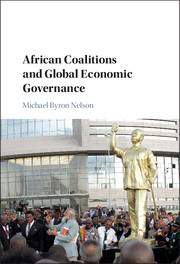Book contents
- Frontmatter
- Contents
- List of Figures
- List of Tables
- Acknowledgments
- List of Abbreviations
- 1 Introduction
- PART I THEORY AND BACKGROUND
- PART II CASES
- 5 Global Food Safety Governance and Africa
- 6 Global IP Governance and African Coalitions
- 7 Africa and the Governance of Agricultural Trade
- 8 Conclusion
- Bibliography
- Index
6 - Global IP Governance and African Coalitions
from PART II - CASES
Published online by Cambridge University Press: 05 September 2016
- Frontmatter
- Contents
- List of Figures
- List of Tables
- Acknowledgments
- List of Abbreviations
- 1 Introduction
- PART I THEORY AND BACKGROUND
- PART II CASES
- 5 Global Food Safety Governance and Africa
- 6 Global IP Governance and African Coalitions
- 7 Africa and the Governance of Agricultural Trade
- 8 Conclusion
- Bibliography
- Index
Summary
It is a fact that the Africa Group made a difference.
– Senior WTO official commenting on the Doha Declaration on the TRIPS Agreement and Public HealthThe governance of patents, industrial design, and copyrights might seem more of the provenance of industrialized, developed countries, but this does not mean that African states lack clear interests in this area of governance. Almost since independence, a number of African states have fought to change or loosen intellectual property (IP) rules to facilitate the transfer of technology from the developed world to them. Perhaps more famously, African states successfully fought to change global patent rules to prioritize their access to medicines for the treatment of HIV/AIDS. And today, African states are attempting to create new areas of IP law to exploit their strengths in terms of genetic resources, traditional knowledge, and cultural heritage.
My argument here is that African states were able to have some success in forming a coalition to gain access to pharmaceuticals owing to the temporary institutional alignments that emphasized rule making within a single institution. But subsequent challenges in that issue area are directly related to continued fragmentation of IP governance. That fragmentation has also made progress on other issues that matter to African states difficult to achieve. Indeed, in global IP governance, African states face a more fragmented system than they do for either agricultural trade or food safety. At the core of the institutional system (IS) are two key international organizations: the World Intellectual Property Organization (WIPO) and the World Trade Organization (WTO). However, depending on the particular issue, a wide variety of secondary institutions can play important roles. For instance, efforts to protect African genetic resources engage the Convention on Biological Diversity (CBD), the Food and Agriculture Organization, and the UN Environmental Program, among others. These alternative forums provide African states with a number of venues for influencing the development of “soft law,” law that lacks binding force. However, they also create challenges for implementing a coordinated national policy with respect to specific issues and limit coalitional tactics. Additionally, IP governance has proven particularly susceptible to forum manipulation by developed states.
- Type
- Chapter
- Information
- African Coalitions and Global Economic Governance , pp. 170 - 205Publisher: Cambridge University PressPrint publication year: 2016



